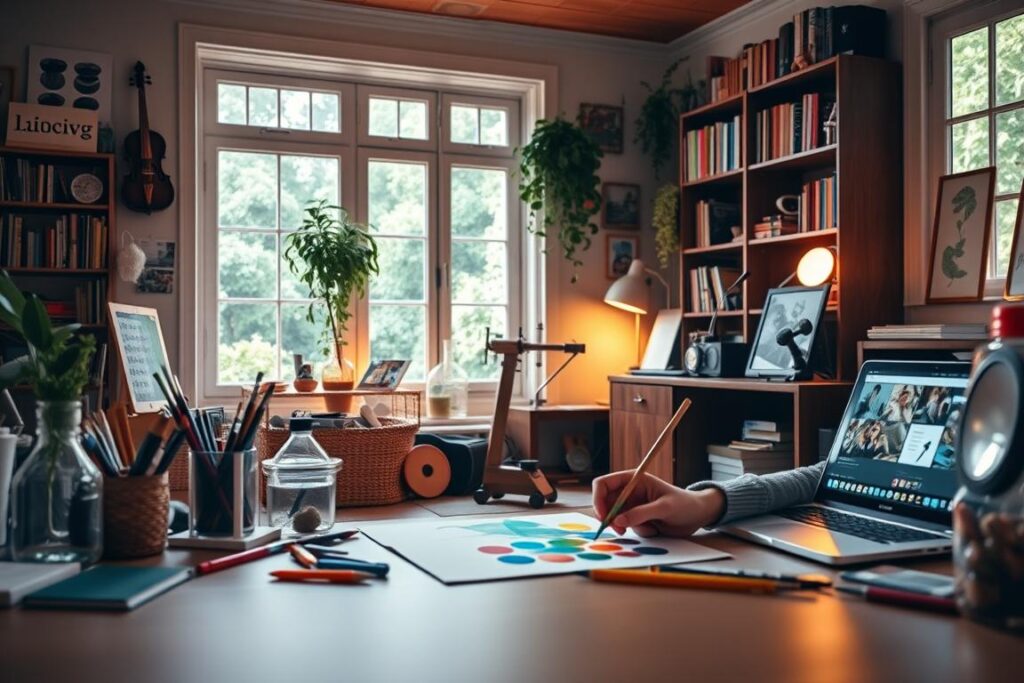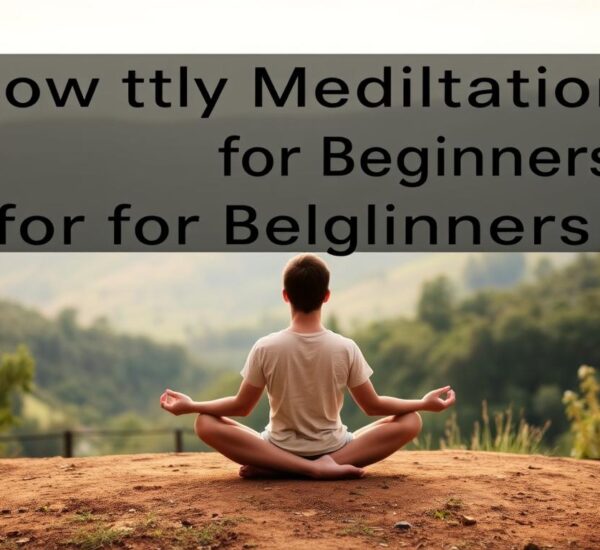Are we missing out on a key part of our well-being by ignoring leisure activities? In today’s fast world, it’s easy to overlook our hobbies and interests.
But, as Christopher Dufresne says, hobbies are not just fun; they are key to who we are and our happiness. They give us breaks from daily life, letting us dive into our passions and talents.
By doing hobbies, we recharge and refocus, learning new things and improving our happiness. Whether it’s music, painting, or sports, hobbies can change our lives.
Key Takeaways
- Leisure activities are vital for our well-being and identity.
- Prioritizing hobbies can lead to personal growth and development.
- Engaging in leisure activities helps us recharge and refocus.
- Hobbies allow us to explore our passions and talents.
- Developing new skills is a big plus of pursuing hobbies.
How Hobbies Enhance Life Skills
Hobbies can make our lives better by helping us grow. They teach us important skills that help in many areas of life.
Playing music or joining sports teams can improve how we talk and work together. Good communication is key in both our personal and work lives. Hobbies offer a great way to get better at this.
Communication Skills Improvement
Activities like public speaking, debating, or writing can boost our communication skills. They help us share our thoughts clearly and listen well. Through hobbies, we become better at talking and listening, making it easier to handle different situations.
Problem-Solving Abilities
Puzzles, strategy games, or cooking can sharpen our problem-solving skills. They make us think deeply and come up with new ideas. These skills are useful in many parts of life, like work and personal projects.
Time Management
Hobbies also teach us to manage our time better. They help us learn to set priorities and balance our lives. Good time management helps us reach our goals and feel less stressed. Hobbies are a great way to learn this skill.
In summary, hobbies are essential for improving our skills, like talking, solving problems, and managing time. By making hobbies a part of our lives, we grow personally, feel better, and become more capable.
The Emotional Benefits of Engaging in Hobbies
Hobbies can deeply improve our emotional health, making our lives better. They offer a break from daily stress, helping us relax and feel refreshed.
Hobbies are great for stress relief and relaxation. Activities like painting, gardening, or playing music calm our minds and bodies.
Stress Relief and Relaxation
Relaxing hobbies help lower stress by giving us a mental break. They offer many ways to relax, including:
- Providing a healthy distraction from stressful thoughts and situations
- Promoting relaxation through calming activities
- Encouraging mindfulness and presence in the moment
Hobbies also boost self-esteem. They give us chances to grow and feel good about ourselves.
Boosting Self-Esteem
Hobbies can make us feel better about ourselves. They offer a sense of achievement and pride. This includes:
- Offering opportunities for personal achievement and recognition
- Fostering a sense of pride and satisfaction in one’s work or creations
- Encouraging self-expression and confidence
For more on how hobbies help personal growth, check out Unlocking Your Potential: How Hobbies Can Boost Personal.
Cultivating Creativity Through Hobbies
Hobbies are more than just fun activities. They help us grow creatively and express ourselves. By trying new hobbies, we can discover new interests and talents. This enriches our lives and helps us grow personally.

Artistic Expression
Artistic hobbies like painting, drawing, writing, or playing music offer a way to express ourselves. They let us share our feelings, thoughts, and experiences in unique ways. Through these hobbies, we can explore our imagination and find our personal style.
Playing a musical instrument, for example, can improve our thinking and confidence. It also gives us a sense of achievement. Visual arts, on the other hand, help us see things differently and understand colors better. They let us create something beautiful and meaningful.
Innovative Thinking
Hobbies like puzzles, strategy games, or some video games boost our innovative thinking. They challenge our minds and teach us to solve problems creatively. By doing these hobbies, we learn to think outside the box and find new solutions.
Strategy games, for instance, teach us to plan and adjust our strategies. This improves our critical thinking and decision-making skills. These skills are useful in both our personal and professional lives.
Through hobbies, we not only make our lives better but also grow as individuals. Creative activities bring us joy, relaxation, and fulfillment. They are key to a balanced and healthy life.
Hobbies as a Tool for Building Resilience
Participating in hobbies helps us build resilience for life’s challenges. Enjoying activities boosts our self-confidence and ability to face tough times. Overcoming obstacles in hobbies strengthens our resilience.
Overcoming Challenges
Hobbies often bring challenges that test our skills and strategies. Learning a new language or playing a musical instrument can be tough. Yet, with persistence, we grow more confident and determined.
Research shows hobbies like fitness and sports build resilience. They teach us to face and overcome challenges. This principle applies to many hobbies, making overcoming obstacles key to building resilience.
Developing Patience
Many hobbies require patience and dedication. Activities like gardening, painting, or cooking teach us patience and the value of effort. As we learn patience through hobbies, we handle life’s frustrations better.
Here’s a table showing how hobbies build patience and resilience:
| Hobby | Patience Development | Resilience Building |
|---|---|---|
| Gardening | Nurturing plants from seed to bloom | Dealing with pests and weather conditions |
| Painting | Mastering techniques and color blending | Overcoming creative blocks and criticism |
| Cooking | Perfecting recipes and techniques | Handling kitchen failures and feedback |
Hobbies that challenge us build resilience. This resilience helps us manage stress and adversity, making life more fulfilling. For more on balancing work and hobbies, check out this guide.
Connecting with Others Through Shared Interests
Hobbies give us a chance to meet people who think like us. They help us feel part of a community. This is key for our happiness and well-being.
Joining clubs or online groups based on our hobbies opens doors to new friendships. For example, being part of a sports team or going to music festivals can introduce us to others who share our passions.
Building Friendships
Friendships built on hobbies are strong because they start with shared interests. This foundation can lead to deeper, more meaningful connections. Plus, group activities help us improve our communication skills and work together towards goals.
Whether it’s a book club, hiking group, or photography club, there are many chances to meet new people. Connecting with others through hobbies can create a supportive network that improves our lives.
Networking Opportunities
Hobbies also offer valuable networking opportunities. By meeting others in our field, we learn about new trends and developments. For instance, going to industry conferences or joining professional organizations related to our hobbies can introduce us to people who can offer advice and support.
Also, the connections we make through hobbies can lead to new career paths. As we grow and develop in our personal and professional lives, these connections become very important.
In summary, hobbies not only make our lives richer but also help us connect with others. By using these opportunities, we can build lasting relationships and discover new experiences and chances.
The Role of Hobbies in Lifelong Learning
Hobbies can spark lifelong learning, helping us grow our knowledge and skills. They let us dive into new interests, push our limits, and adopt a growth mindset.
Expanding Knowledge
Hobbies open doors to new areas of interest, broadening our knowledge. For example, learning a new language or starting a new sport can be both fun and enriching.
Skill Development
Through hobbies, we can pick up new skills or improve ones we already have. Christopher Dufresne points out that hobbies like audiovisual work are great for skill-building.
| Hobby | Knowledge Expansion | Skill Development |
|---|---|---|
| Learning a New Language | Cultural understanding, linguistic skills | Communication, cognitive skills |
| Audiovisual Production | Technical knowledge, creative expression | Technical skills, creativity |
| Sports and Fitness | Physical health, sports strategies | Physical skills, teamwork |

In conclusion, hobbies are key to lifelong learning. They offer chances to grow our knowledge and skills. By taking part in hobbies, we encourage a culture of ongoing learning and personal growth.
Hobbies and Physical Well-Being
Participating in various hobbies can boost our health and life quality. Different activities not only improve our physical health but also our mental well-being.
The Benefits of Active Pursuits
Active hobbies like hiking, biking, or swimming are great for our health. They help keep our weight in check, improve heart health, and boost fitness.
Active hobbies offer many physical health benefits. For example, hobbies like jogging or dancing can:
- Improve cardiovascular health
- Enhance muscular strength and endurance
- Boost flexibility and balance
| Active Hobby | Physical Benefit | Mental Benefit |
|---|---|---|
| Hiking | Improves cardiovascular health | Reduces stress |
| Swimming | Enhances muscular strength | Improves mood |
| Dancing | Boosts flexibility and balance | Increases happiness |
Enhancements in Mental Health
Hobbies are also key for better mental health. Activities that challenge our minds or offer a creative outlet can lower stress and anxiety.
Engaging in hobbies that support mental well-being can greatly impact our health. For instance, hobbies like painting or playing a musical instrument can:
- Reduce symptoms of anxiety and depression
- Improve cognitive function
- Enhance creativity
Setting Goals and Achievements with Hobbies
Hobbies let us set personal goals and feel a sense of accomplishment. They help us grow by doing things we love. This way, we can reach goals that match our interests and passions.
Establishing Personal Goals
When we enjoy hobbies, we often set goals to stay motivated. For instance, a musician might want to learn a new piece. A runner might aim to finish a marathon. Setting realistic goals helps us grow and track our progress.
| Goal Type | Hobby Example | Benefit |
|---|---|---|
| Skill-based | Learning a new language | Improved cognitive abilities |
| Performance-based | Completing a marathon | Enhanced physical fitness |
| Creative | Painting or drawing | Increased self-expression |
Celebrating Milestones
Celebrating our achievements is key to goal-setting. Recognizing our progress boosts our motivation. Leisure activities for personal development bring joy and fulfillment. Celebrating milestones helps us see how far we’ve come and look forward to the future.
How Hobbies Foster a Positive Mindset
Hobbies are key in shaping our mindset. They help us see life’s challenges in a more optimistic way. By doing things we love, we boost our mental health and look at life positively.
Gratitude and Mindfulness
Hobbies help us feel grateful and mindful. When we do things we enjoy, we live in the moment. We see the joy and beauty in our lives.
For example, gardening or painting makes us focus on the journey, not just the end result. This helps us appreciate the little things in life.
Developing Optimism
Hobbies also help us become more optimistic. Achieving small goals in our hobbies boosts our confidence. This makes us see life in a more positive light.
Here is a comparison of how different hobbies can impact our mindset:
| Hobby | Mindfulness | Optimism | Gratitude |
|---|---|---|---|
| Gardening | High | Medium | High |
| Painting | High | High | Medium |
| Playing a musical instrument | Medium | High | High |
By adding hobbies to our lives, we can foster a positive mindset. This improves our overall well-being.
Finding Balance in Life with Hobbies
Hobbies can greatly help us find balance in life. They improve our personal growth and well-being. By doing things we love, we find purpose and direction. This helps us face life’s challenges with confidence.
Creating Harmony
Hobbies give us a break from daily stress. They help us recharge and refocus. Activities like playing music, painting, or sports boost our mental and physical health.
They help us grow by teaching new skills, building resilience, and keeping a positive mindset.
Prioritizing Well-being
By making hobbies a priority, we achieve a better balance between work and life. This leads to a more fulfilling existence. Hobbies help us explore our interests, grow creatively, and boost our self-esteem.
As we enjoy these activities, our quality of life improves. This shows how hobbies play a key role in personal development.



